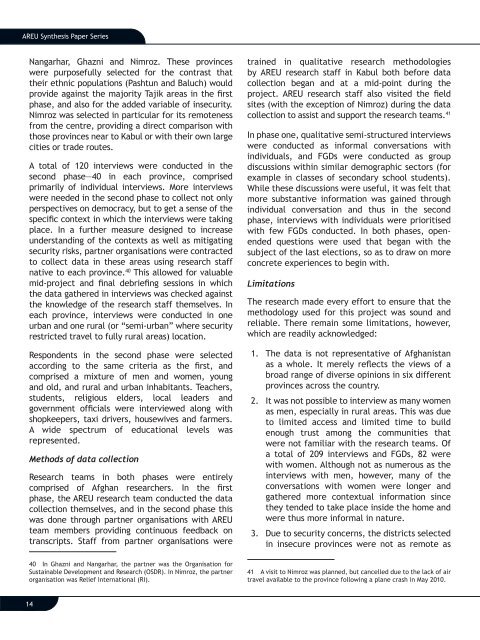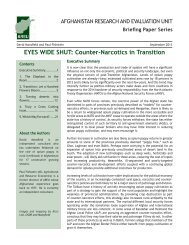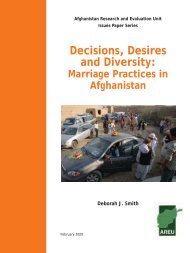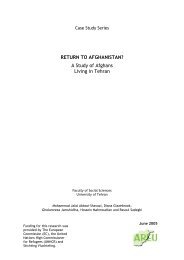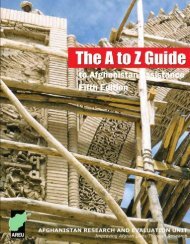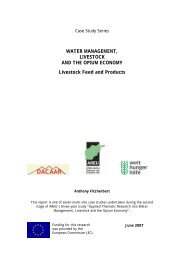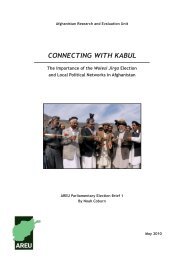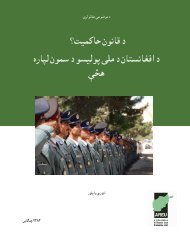“Democracy” in Afghanistan - the Afghanistan Research and ...
“Democracy” in Afghanistan - the Afghanistan Research and ...
“Democracy” in Afghanistan - the Afghanistan Research and ...
You also want an ePaper? Increase the reach of your titles
YUMPU automatically turns print PDFs into web optimized ePapers that Google loves.
AREU Syn<strong>the</strong>sis Paper Series<br />
Nangarhar, Ghazni <strong>and</strong> Nimroz. These prov<strong>in</strong>ces<br />
were purposefully selected for <strong>the</strong> contrast that<br />
<strong>the</strong>ir ethnic populations (Pashtun <strong>and</strong> Baluch) would<br />
provide aga<strong>in</strong>st <strong>the</strong> majority Tajik areas <strong>in</strong> <strong>the</strong> first<br />
phase, <strong>and</strong> also for <strong>the</strong> added variable of <strong>in</strong>security.<br />
Nimroz was selected <strong>in</strong> particular for its remoteness<br />
from <strong>the</strong> centre, provid<strong>in</strong>g a direct comparison with<br />
those prov<strong>in</strong>ces near to Kabul or with <strong>the</strong>ir own large<br />
cities or trade routes.<br />
A total of 120 <strong>in</strong>terviews were conducted <strong>in</strong> <strong>the</strong><br />
second phase—40 <strong>in</strong> each prov<strong>in</strong>ce, comprised<br />
primarily of <strong>in</strong>dividual <strong>in</strong>terviews. More <strong>in</strong>terviews<br />
were needed <strong>in</strong> <strong>the</strong> second phase to collect not only<br />
perspectives on democracy, but to get a sense of <strong>the</strong><br />
specific context <strong>in</strong> which <strong>the</strong> <strong>in</strong>terviews were tak<strong>in</strong>g<br />
place. In a fur<strong>the</strong>r measure designed to <strong>in</strong>crease<br />
underst<strong>and</strong><strong>in</strong>g of <strong>the</strong> contexts as well as mitigat<strong>in</strong>g<br />
security risks, partner organisations were contracted<br />
to collect data <strong>in</strong> <strong>the</strong>se areas us<strong>in</strong>g research staff<br />
native to each prov<strong>in</strong>ce. 40 This allowed for valuable<br />
mid-project <strong>and</strong> f<strong>in</strong>al debrief<strong>in</strong>g sessions <strong>in</strong> which<br />
<strong>the</strong> data ga<strong>the</strong>red <strong>in</strong> <strong>in</strong>terviews was checked aga<strong>in</strong>st<br />
<strong>the</strong> knowledge of <strong>the</strong> research staff <strong>the</strong>mselves. In<br />
each prov<strong>in</strong>ce, <strong>in</strong>terviews were conducted <strong>in</strong> one<br />
urban <strong>and</strong> one rural (or “semi-urban” where security<br />
restricted travel to fully rural areas) location.<br />
Respondents <strong>in</strong> <strong>the</strong> second phase were selected<br />
accord<strong>in</strong>g to <strong>the</strong> same criteria as <strong>the</strong> first, <strong>and</strong><br />
comprised a mixture of men <strong>and</strong> women, young<br />
<strong>and</strong> old, <strong>and</strong> rural <strong>and</strong> urban <strong>in</strong>habitants. Teachers,<br />
students, religious elders, local leaders <strong>and</strong><br />
government officials were <strong>in</strong>terviewed along with<br />
shopkeepers, taxi drivers, housewives <strong>and</strong> farmers.<br />
A wide spectrum of educational levels was<br />
represented.<br />
Methods of data collection<br />
<strong>Research</strong> teams <strong>in</strong> both phases were entirely<br />
comprised of Afghan researchers. In <strong>the</strong> first<br />
phase, <strong>the</strong> AREU research team conducted <strong>the</strong> data<br />
collection <strong>the</strong>mselves, <strong>and</strong> <strong>in</strong> <strong>the</strong> second phase this<br />
was done through partner organisations with AREU<br />
team members provid<strong>in</strong>g cont<strong>in</strong>uous feedback on<br />
transcripts. Staff from partner organisations were<br />
40 In Ghazni <strong>and</strong> Nangarhar, <strong>the</strong> partner was <strong>the</strong> Organisation for<br />
Susta<strong>in</strong>able Development <strong>and</strong> <strong>Research</strong> (OSDR). In Nimroz, <strong>the</strong> partner<br />
organisation was Relief International (RI).<br />
tra<strong>in</strong>ed <strong>in</strong> qualitative research methodologies<br />
by AREU research staff <strong>in</strong> Kabul both before data<br />
collection began <strong>and</strong> at a mid-po<strong>in</strong>t dur<strong>in</strong>g <strong>the</strong><br />
project. AREU research staff also visited <strong>the</strong> field<br />
sites (with <strong>the</strong> exception of Nimroz) dur<strong>in</strong>g <strong>the</strong> data<br />
collection to assist <strong>and</strong> support <strong>the</strong> research teams. 41<br />
In phase one, qualitative semi-structured <strong>in</strong>terviews<br />
were conducted as <strong>in</strong>formal conversations with<br />
<strong>in</strong>dividuals, <strong>and</strong> FGDs were conducted as group<br />
discussions with<strong>in</strong> similar demographic sectors (for<br />
example <strong>in</strong> classes of secondary school students).<br />
While <strong>the</strong>se discussions were useful, it was felt that<br />
more substantive <strong>in</strong>formation was ga<strong>in</strong>ed through<br />
<strong>in</strong>dividual conversation <strong>and</strong> thus <strong>in</strong> <strong>the</strong> second<br />
phase, <strong>in</strong>terviews with <strong>in</strong>dividuals were prioritised<br />
with few FGDs conducted. In both phases, openended<br />
questions were used that began with <strong>the</strong><br />
subject of <strong>the</strong> last elections, so as to draw on more<br />
concrete experiences to beg<strong>in</strong> with.<br />
Limitations<br />
The research made every effort to ensure that <strong>the</strong><br />
methodology used for this project was sound <strong>and</strong><br />
reliable. There rema<strong>in</strong> some limitations, however,<br />
which are readily acknowledged:<br />
1. The data is not representative of <strong>Afghanistan</strong><br />
as a whole. It merely reflects <strong>the</strong> views of a<br />
broad range of diverse op<strong>in</strong>ions <strong>in</strong> six different<br />
prov<strong>in</strong>ces across <strong>the</strong> country.<br />
2. It was not possible to <strong>in</strong>terview as many women<br />
as men, especially <strong>in</strong> rural areas. This was due<br />
to limited access <strong>and</strong> limited time to build<br />
enough trust among <strong>the</strong> communities that<br />
were not familiar with <strong>the</strong> research teams. Of<br />
a total of 209 <strong>in</strong>terviews <strong>and</strong> FGDs, 82 were<br />
with women. Although not as numerous as <strong>the</strong><br />
<strong>in</strong>terviews with men, however, many of <strong>the</strong><br />
conversations with women were longer <strong>and</strong><br />
ga<strong>the</strong>red more contextual <strong>in</strong>formation s<strong>in</strong>ce<br />
<strong>the</strong>y tended to take place <strong>in</strong>side <strong>the</strong> home <strong>and</strong><br />
were thus more <strong>in</strong>formal <strong>in</strong> nature.<br />
3. Due to security concerns, <strong>the</strong> districts selected<br />
<strong>in</strong> <strong>in</strong>secure prov<strong>in</strong>ces were not as remote as<br />
41 A visit to Nimroz was planned, but cancelled due to <strong>the</strong> lack of air<br />
travel available to <strong>the</strong> prov<strong>in</strong>ce follow<strong>in</strong>g a plane crash <strong>in</strong> May 2010.<br />
14


